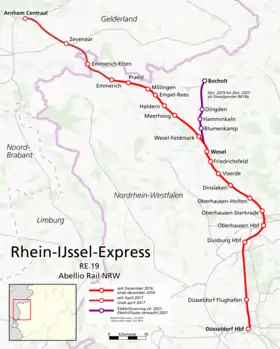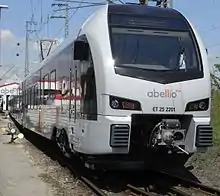Rhein-IJssel-Express
The Rhein-IJssel-Express is a Regional-Express service in German state of North Rhine-Westphalia and the Dutch province of Gelderland, in service as from December 2016 from Düsseldorf to Emmerich am Rhein. The service was extended to Arnhem in April 2017. It is planned to extend it to Bocholt.
| RE 19 RE 19a Rhein-IJssel-Express | |||||||||||||||||||||||||||||||||||||||||||||||||||||||||||||||||||||||||||||||||||||||||||||||||||||||||||||||||||||||||||||||||||||||||||||||||||||||||||||||||||||||||||||||||||||||||||||||||||||||||
|---|---|---|---|---|---|---|---|---|---|---|---|---|---|---|---|---|---|---|---|---|---|---|---|---|---|---|---|---|---|---|---|---|---|---|---|---|---|---|---|---|---|---|---|---|---|---|---|---|---|---|---|---|---|---|---|---|---|---|---|---|---|---|---|---|---|---|---|---|---|---|---|---|---|---|---|---|---|---|---|---|---|---|---|---|---|---|---|---|---|---|---|---|---|---|---|---|---|---|---|---|---|---|---|---|---|---|---|---|---|---|---|---|---|---|---|---|---|---|---|---|---|---|---|---|---|---|---|---|---|---|---|---|---|---|---|---|---|---|---|---|---|---|---|---|---|---|---|---|---|---|---|---|---|---|---|---|---|---|---|---|---|---|---|---|---|---|---|---|---|---|---|---|---|---|---|---|---|---|---|---|---|---|---|---|---|---|---|---|---|---|---|---|---|---|---|---|---|---|---|---|---|
 map of the route | |||||||||||||||||||||||||||||||||||||||||||||||||||||||||||||||||||||||||||||||||||||||||||||||||||||||||||||||||||||||||||||||||||||||||||||||||||||||||||||||||||||||||||||||||||||||||||||||||||||||||
| Overview | |||||||||||||||||||||||||||||||||||||||||||||||||||||||||||||||||||||||||||||||||||||||||||||||||||||||||||||||||||||||||||||||||||||||||||||||||||||||||||||||||||||||||||||||||||||||||||||||||||||||||
| Owner | VRR | ||||||||||||||||||||||||||||||||||||||||||||||||||||||||||||||||||||||||||||||||||||||||||||||||||||||||||||||||||||||||||||||||||||||||||||||||||||||||||||||||||||||||||||||||||||||||||||||||||||||||
| Line number | RE 19 | ||||||||||||||||||||||||||||||||||||||||||||||||||||||||||||||||||||||||||||||||||||||||||||||||||||||||||||||||||||||||||||||||||||||||||||||||||||||||||||||||||||||||||||||||||||||||||||||||||||||||
| Locale | North Rhine-Westphalia, Germany | ||||||||||||||||||||||||||||||||||||||||||||||||||||||||||||||||||||||||||||||||||||||||||||||||||||||||||||||||||||||||||||||||||||||||||||||||||||||||||||||||||||||||||||||||||||||||||||||||||||||||
| Service | |||||||||||||||||||||||||||||||||||||||||||||||||||||||||||||||||||||||||||||||||||||||||||||||||||||||||||||||||||||||||||||||||||||||||||||||||||||||||||||||||||||||||||||||||||||||||||||||||||||||||
| Operator(s) | Abellio Rail NRW | ||||||||||||||||||||||||||||||||||||||||||||||||||||||||||||||||||||||||||||||||||||||||||||||||||||||||||||||||||||||||||||||||||||||||||||||||||||||||||||||||||||||||||||||||||||||||||||||||||||||||
| Technical | |||||||||||||||||||||||||||||||||||||||||||||||||||||||||||||||||||||||||||||||||||||||||||||||||||||||||||||||||||||||||||||||||||||||||||||||||||||||||||||||||||||||||||||||||||||||||||||||||||||||||
| Line length | 92 km (57 mi) | ||||||||||||||||||||||||||||||||||||||||||||||||||||||||||||||||||||||||||||||||||||||||||||||||||||||||||||||||||||||||||||||||||||||||||||||||||||||||||||||||||||||||||||||||||||||||||||||||||||||||
| |||||||||||||||||||||||||||||||||||||||||||||||||||||||||||||||||||||||||||||||||||||||||||||||||||||||||||||||||||||||||||||||||||||||||||||||||||||||||||||||||||||||||||||||||||||||||||||||||||||||||
Der Bocholter (RE 19a) connects Wesel with Bocholt. After the planned electrification of the Bocholt–Wesel railway, it is to be integrated in the RE 19 as a portion-worked service coupled and uncoupled in Wesel, with the aim of creating a continuous service between Düsseldorf to Bocholt.[1][2] Due to delays in the upgrade of the line's infrastructure, the implementation of the portion working has been indefinitely delayed.[3]
The lines are operated by Abellio Rail NRW on behalf of Verkehrsverbund Rhein-Ruhr (VRR).
There are three other international Regional-Expresses in North Rhine-Westphalia: the Maas-Wupper-Express, the LIMAX (Liège-Maastricht-Aachen-Express) and the euregioAIXpress (between Aachen and Spa).
History
Until December 2016, the service was branded as Regionalbahn line Der Weseler (RB 35) from Duisburg to Wesel and operated towards Emmerich, Düsseldorf or Cologne during the peak in the peak direction. It was launched in 1998 with the introduction of the NRW-Takt (Clock-face timetable). The line was operated with 425/426 class sets and sometimes with locomotive-hauled Silberling carriages by DB Regio NRW.
Except for a test service that ran from December 2005 to June 2006 as Der Arnheimer (RB 34) between Emmerich and Arnhem, there had been no cross-border regional services between Amsterdam and Cologne since the cessation of the Eilzug (regional fast train) service on the Oberhausen–Arnhem railway in the 1980s.[4] Cross-border journeys have since then only been possible by bus or ICE International services.
In order to again offer an attractive cross-border regional service, the Rhein-IJssel-Express was extended from Emmerich via Zevenaar to Arnhem on 6 April 2017, where it connects to the InterCity, regional sprinter services of the Nederlandse Spoorwegen (Dutch Railways), as well as to local trains (Stoptrein) operated by Breng and Arriva. Between Zevenaar and Arnhem, the, RE 19 complements the Dutch Arnhem–Doetinchem–Winterswijk (operated by Arriva) and Arnhem–Doetinchem (operated by Breng) stopping trains.
Another component of the tender of December 2016 was the operation of the non-electrified Wesel–Bocholt line. The Der Bocholter regional service (formerly the RB 32) was introduced on this line from Wesel to Bocholt.[5] Assuming that the electrification of the railway line would be completed in December 2019, allowing portion working of the RE 19 line from Wesel, the line number RB 32 was re-assigned to the Rhein-Emscher-Bahn in advance of the 2019 timetable change. This meant that the Der Bocholter had to be assigned a new line number. Since then, the line has been designated as RE 19a, which was originally intended to be used for the portion-worked service, but as electrification of the line has not proceeded so far, the RE 19 cannot run on the line.
Rolling stock

Abellio procured nine Stadler Flirt 3 trainsets for use on the Rhein-IJssel-Express. These are three-system capable:
- 15 kV 16.7 Hz AC (~) for the Düsseldorf–Elten section
- 25 kV 50 Hz ~ for the Elten–Zevenaar section
- 1.5 kV DC (=) for the Zevenaar–Arnhem section
Diesel-powered Alstom Coradia LINT sets will be used for the RE 19a service until the line is electrified.[6]
A new workshop was built in Duisburg by Abellio to maintain the trainsets.
Route
The Regional-Express runs on the following railways:
- Cologne–Duisburg railway from Düsseldorf to Duisburg
- Duisburg–Dortmund railway from Duisburg to Oberhausen
- Oberhausen–Arnhem railway from Oberhausen to Emmerich, over the whole length from 2017
- Bocholt–Wesel railway, over the whole length from 2018.
Hellweg-Express
In the early days of the NRW clock-face timetable, there was another Regional-Express service that was designated as the RE 19. This service, called the Hellweg-Express, was operated by DB Regio NRW on the route from Dortmund via Unna to Warburg from 1998 to 2002. It was replaced at the timetable change on 15 December 2002 by the RB 59 Hellweg-Bahn and the RB 89.[7]
Notes
- "VRR beauftragt Abellio mit dem Betrieb des Niederrhein-Netzes" (Press release) (in German). Abellio Deutschland. 2 April 2013. Retrieved 3 February 2017.
- "Abellio Rail NRW baut Bahnbetriebswerk in Duisburg" (in German). newstix.de. 2 December 2015. Retrieved 3 February 2017.
- "Sachstandsbericht Z/IX/2019/0518" (in German). Verkehrsverbund Rhein-Ruhr AöR. 1 March 2019. p. 4. Retrieved 22 April 2020.
- Matthias Oomen. "Grenzüberschreitender Verkehr: Schlechte Verbindungen zwischen Kohle und Tulpen" (PDF). Der Fahrgast (in German). Fahrgastverband Pro Bahn (2/2009): 19. Retrieved 3 February 2017.
- Joost, André. "RB32: Der Bocholter". NRW Rail Archive (in German). Retrieved 22 April 2020.
- "Der Bocholter" (in German). Abellio GmbH. Retrieved 22 April 2020.
- Verbundfahrplan Schnellverkehr 2003. Gelsenkirchen: Verkehrsverbund Rhein-Ruhr. 2002. p. 6.